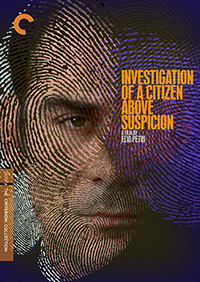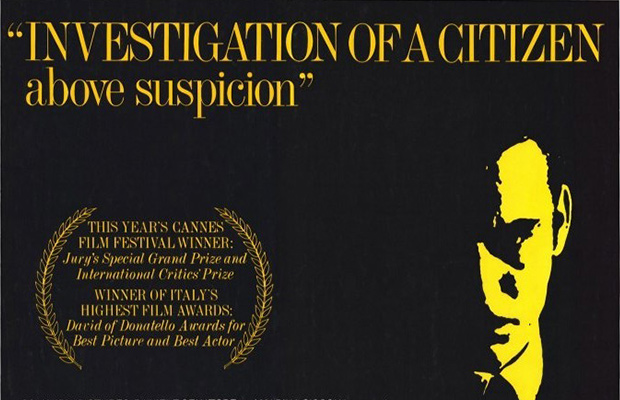Disc Reviews
Criterion Collection: Investigation of a Citizen Above Suspicion | Blu-ray Review
 Winner of the Best Foreign Language Film in 1970, as well as the Grand Jury and FIPRESCI Prize Winner at the Cannes Film Festival, Italian auteur Elio Petri’s Investigation Of a Citizen Above Suspicion gets a splendorous digital transfer from Criterion this month, a notable title that remains one of the director’s finest works, as absurdly surreal as it is bafflingly realistic in its depiction of Italy’s actual political situation during the time period. And, perhaps due to this depiction, but also in part due to Petri’s own left wing siding, its protagonist’s paranoia towards liberalism seems to unmask the evils allowed by a democracy as merely a pretty euphemism for fascism. But whatever Petri’s own political agenda may or may not be with this darkly comedic tale of a grotesque abuse of power, it certainly would be apt to describe the film as Kafkaesque (and Petri wraps things up niftily with quote from The Trial; only, instead of Josef K.’s point of view, Petri is showing the captor (or the state’s) hopes and struggles.
Winner of the Best Foreign Language Film in 1970, as well as the Grand Jury and FIPRESCI Prize Winner at the Cannes Film Festival, Italian auteur Elio Petri’s Investigation Of a Citizen Above Suspicion gets a splendorous digital transfer from Criterion this month, a notable title that remains one of the director’s finest works, as absurdly surreal as it is bafflingly realistic in its depiction of Italy’s actual political situation during the time period. And, perhaps due to this depiction, but also in part due to Petri’s own left wing siding, its protagonist’s paranoia towards liberalism seems to unmask the evils allowed by a democracy as merely a pretty euphemism for fascism. But whatever Petri’s own political agenda may or may not be with this darkly comedic tale of a grotesque abuse of power, it certainly would be apt to describe the film as Kafkaesque (and Petri wraps things up niftily with quote from The Trial; only, instead of Josef K.’s point of view, Petri is showing the captor (or the state’s) hopes and struggles.
With a viciously simple narrative, we’re introduced to a Roman police inspector (Gian Maria Volonte), who, on his last days as chief of the Homicide division, decides to murder the masochistic, married socialite he’s been schtupping. By the time her corpse discovered, he’s now the chief of the political branch, which is responsible for spying on subversive enemies of the state. Having left a multitude of clues at the crime scene, he takes it upon himself to assist his replacement in homicide with investigating the crime, watching gleefully as they dismiss the alarming amount of evidence stacking up against the chief. While he wavers between wanting to be caught and proving he indeed holds significant power as a citizen above the law, he manages to steer the investigation’s focus back to himself by stomping out the other suspects, such as the woman’s husband, who happens to be gay, and the woman’s other lover, a radical student that lives downstairs. We learn, via flashback, that the woman sought the chief out as a kinky lover, his domineering sadism forcing her into various poses modeled after real life crime scenes.
Disc Review
Petri’s penchant for extreme close-up and whirling zooms look extravagantly arresting in Criterion’s digital restoration with a dual format edition loaded with special features. An archival interview from October of 1959 with Petri, conducted by critic and filmmaker Alexandre Astruc is a definite interest, while a ninety minute documentary from 2005 about Petri’s career is an excellent introduction to those unfamiliar with his work. Several other features feel repetitive in comparison, such as a new interview with film scholar Camilla Zamboni and a sixty minute documentary about Gian Maria Volonte. A short interview with Ennio Morricone from 2010, Music in His Blood, is an interesting aside about the creation of the iconic score.
Final Thoughts
A ravishing addition to the Criterion line-up, Investigation of a Citizen Above Suspicion is an excellent entry into Petri’s impeccable and diverse filmography. It marks the pinnacle of a lucrative union with Morricone (who first worked with Petri on A Quiet Place in the Country), whose half playful, half deliriously creepy score here is a definite highlight, as well as a Petri’s highpoint of collaboration with Gian Maria Volonte, who gives a career best performance. Volonte should be most recognizable to Western eyes as the villain in the first two installments of Sergio Leone’s Man With No Name trilogy, but here he’s a commanding mix of aggressive dominance and manipulative sniveling. An arresting speech, where he may as well be channeling the likes of Stalin, has him equating liberalism with sexual deviancy, announcing that “Repression is the vaccine… repression is our civilization,” and since the “populace lacks maturity,” it’s his job as representative of the law to “repress them!” Full of grandiloquent hysterics, it almost seems silly, until Petri throws in some sobering torture sequences that only serve as more pleasant reminders of actual atrocities permitted by a fear based government.
Filled with frenetically energized imagery from DP Luigi Kuveiller (who worked with giallo masters Luci Fulci and Dario Argento around the same time period), Investigation is filled with whirling camera pans, sweat-infused glaring close-ups, and anxious bird’s eye shots of a secret realm in Rome that never seems to get out of the basements and into the streets. “Revolution is like syphilis,” the chief crassly remarks of certain radical agitators, who are likened as mere copies of rebellious factions of yore, “it’s in their blood.” As is Petri’s delightful legacy, from the brilliant sci-fi cult flick The 10th Victim, the scintillating imagery of insanity in A Quiet Place in the Country, to this disturbing commentary on the nature of powers that be, once experienced, are in your blood, a transmitted disease of imagery, ideas, and unforgettable moods.
Los Angeles based Nicholas Bell is IONCINEMA.com's Chief Film Critic and covers film festivals such as Sundance, Berlin, Cannes and TIFF. He is part of the critic groups on Rotten Tomatoes, The Los Angeles Film Critics Association (LAFCA), the Online Film Critics Society (OFCS) and GALECA. His top 3 for 2021: France (Bruno Dumont), Passing (Rebecca Hall) and Nightmare Alley (Guillermo Del Toro). He was a jury member at the 2019 Cleveland International Film Festival.

































